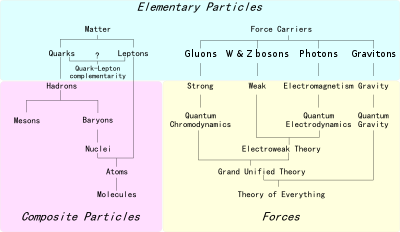
A | B | C | D | E | F | G | H | CH | I | J | K | L | M | N | O | P | Q | R | S | T | U | V | W | X | Y | Z | 0 | 1 | 2 | 3 | 4 | 5 | 6 | 7 | 8 | 9
A bound state is a composite of two or more fundamental building blocks, such as particles, atoms, or bodies, that behaves as a single object and in which energy is required to split them.[1]
In quantum physics, a bound state is a quantum state of a particle subject to a potential such that the particle has a tendency to remain localized in one or more regions of space.[2] The potential may be external or it may be the result of the presence of another particle; in the latter case, one can equivalently define a bound state as a state representing two or more particles whose interaction energy exceeds the total energy of each separate particle. One consequence is that, given a potential vanishing at infinity, negative-energy states must be bound. The energy spectrum of the set of bound states are most commonly discrete, unlike scattering states of free particles, which have a continuous spectrum.
Although not bound states in the strict sense, metastable states with a net positive interaction energy, but long decay time, are often considered unstable bound states as well and are called "quasi-bound states".[3] Examples include radionuclides and Rydberg atoms.[4]
In relativistic quantum field theory, a stable bound state of n particles with masses corresponds to a pole in the S-matrix with a center-of-mass energy less than . An unstable bound state shows up as a pole with a complex center-of-mass energy.
Examples

- A proton and an electron can move separately; when they do, the total center-of-mass energy is positive, and such a pair of particles can be described as an ionized atom. Once the electron starts to "orbit" the proton, the energy becomes negative, and a bound state – namely the hydrogen atom – is formed. Only the lowest-energy bound state, the ground state, is stable. Other excited states are unstable and will decay into stable (but not other unstable) bound states with less energy by emitting a photon.
- A positronium "atom" is an unstable bound state of an electron and a positron. It decays into photons.
- Any state in the quantum harmonic oscillator is bound, but has positive energy. Note that , so the below does not apply.
- A nucleus is a bound state of protons and neutrons (nucleons).
- The proton itself is a bound state of three quarks (two up and one down; one red, one green and one blue). However, unlike the case of the hydrogen atom, the individual quarks can never be isolated. See confinement.
- The Hubbard and Jaynes–Cummings–Hubbard (JCH) models support similar bound states. In the Hubbard model, two repulsive bosonic atoms can form a bound pair in an optical lattice.[5][6][7] The JCH Hamiltonian also supports two-polariton bound states when the photon-atom interaction is sufficiently strong.[8]
Definition
Let σ-finite measure space be a probability space associated with separable complex Hilbert space . Define a one-parameter group of unitary operators , a density operator and an observable on . Let be the induced probability distribution of with respect to . Then the evolution
is bound with respect to if
- ,
A quantum particle is in a bound state if at no point in time it is found “too far away" from any finite region . Using a wave function representation, for example, this means
such that
In general, a quantum state is a bound state if and only if it is finitely normalizable for all times .[10] Furthermore, a bound state lies within the pure point part of the spectrum of if and only if it is an eigenstate of .[11]
More informally, "boundedness" results foremost from the choice of domain of definition and characteristics of the state rather than the observable.[nb 1] For a concrete example: let and let be the position operator. Given compactly supported and .
- If the state evolution of "moves this wave package to the right", e.g. if for all , then is not bound state with respect to position.
- If does not change in time, i.e. for all , then is bound with respect to position.
- More generally: If the state evolution of "just moves inside a bounded domain", then is bound with respect to position.
Properties
As finitely normalizable states must lie within the pure point part of the spectrum, bound states must lie within the pure point part. However, as Neumann and Wigner pointed out, it is possible for the energy of a bound state to be located in the continuous part of the spectrum. This phenomenon is referred to as bound state in the continuum.[12][13]
Position-bound states
Consider the one-particle Schrödinger equation. If a state has energy
Antropológia
Aplikované vedy
Bibliometria
Dejiny vedy
Encyklopédie
Filozofia vedy
Forenzné vedy
Humanitné vedy
Knižničná veda
Kryogenika
Kryptológia
Kulturológia
Literárna veda
Medzidisciplinárne oblasti
Metódy kvantitatívnej analýzy
Metavedy
Metodika
Text je dostupný za podmienok Creative
Commons Attribution/Share-Alike License 3.0 Unported; prípadne za ďalších
podmienok.
Podrobnejšie informácie nájdete na stránke Podmienky
použitia.
www.astronomia.sk | www.biologia.sk | www.botanika.sk | www.dejiny.sk | www.economy.sk | www.elektrotechnika.sk | www.estetika.sk | www.farmakologia.sk | www.filozofia.sk | Fyzika | www.futurologia.sk | www.genetika.sk | www.chemia.sk | www.lingvistika.sk | www.politologia.sk | www.psychologia.sk | www.sexuologia.sk | www.sociologia.sk | www.veda.sk I www.zoologia.sk























